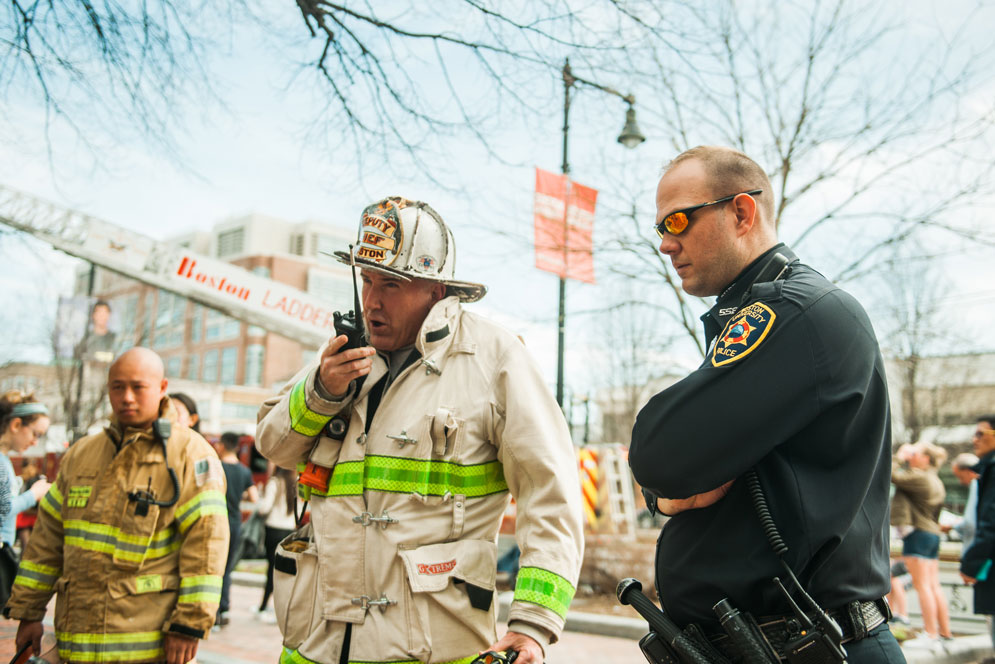A Dozen Tips That Could Save Your Life in a Fire
BU, city offer resources for students living on campus and off

Hoping to avoid tragedies, the Boston Fire Department and the University offer tips to students for keeping their on- and off-campus residences safe. Photo by Janice Checchio
Just two weeks before graduation in 2013, Binland Lee (CAS’13) died in a fire on Linden Street in Allston. Among the housing violations cited in the report of that deadly fire were the number of tenants—18 (the city permits no more than 4 undergraduates to live full-time in a house)—and only one exit from the floor below her room.
The tragedy spurred the city to boost apartment inspections and other safety measures and highlighted the fact that BU students living off campus are beyond the purview of the University’s rigorous fire safety rules. With a new school year under way, the University is advising students, on and off campus, of ways to keep safe and of city and BU resources that can help them do so.
Here are a dozen tips that could save your life:
- Before moving in, survey the building and make sure that there are working smoke detectors and carbon monoxide detectors. Check the locks for deadbolts or padlocks that would prevent you from getting out in the event of a fire.
- Don’t use candles. Wax-with-wicks are the most common fire-starters among college students. Candles, as well as incense, open flames, and smoking, are banned in BU dorms.
- Have a fire extinguisher within easy reach. Also, purchase flashlights and extra smoke detectors, and batteries for both.
- Make sure there is a smoke detector outside each sleeping area in the apartment.
- Have a carbon monoxide detector on each level of the house.
- Know two escape routes out of your building and make sure they are free of debris.
- If you smoke, have a metal canister with sand or water to put out smoking materials safely. Better still, don’t smoke inside. (Smoking is prohibited in University housing.)
- Don’t overload electrical outlets. All electrical equipment, cords, and power strips should be listed by safety certification company UL.
- Whenever an alarm sounds, assume it’s for a reason—and get out.
- If there’s a fire and you must evacuate the building, if it’s smoky, stay low to the floor. Before opening a door, feel it with the back of your hand and don’t open it if the door is hot.
- Never use a gas stove or oven to heat your place; it could lead to carbon monoxide poisoning.
- If you grill, watch where you do it. Boston and Brookline ban charcoal grills on wooden porches. And make sure you put out the embers with water when you’re finished. As for gas grills, state law forbids their use or storage anywhere inside or above the first floor of any residence.
Resources with this information and other details include BU’s fire safety website, detailing the University’s fire regulations and advice; BU’s Environmental Health and Safety website, with a fire safety checklist, questions to ask before signing a lease, and tips on hosting safe parties; a state website listing renters’ rights; and the city’s Bos:311 service, for reporting problems with unresponsive landlords and broken smoke alarms.
Students whose landlords have refused to fix problems can contact the city’s Inspectional Services at 617-635-5300 to schedule an inspection of their unit. The department will cite the landlord for any violations and order the landlord to correct them. The Boston Fire Department offers a list of safety tips, and the city provides a home safety checklist.
BU also provides, via Blackboard, online training for managing an emergency here; scroll to the “Take Online Emergency Training” section.
Comments & Discussion
Boston University moderates comments to facilitate an informed, substantive, civil conversation. Abusive, profane, self-promotional, misleading, incoherent or off-topic comments will be rejected. Moderators are staffed during regular business hours (EST) and can only accept comments written in English. Statistics or facts must include a citation or a link to the citation.